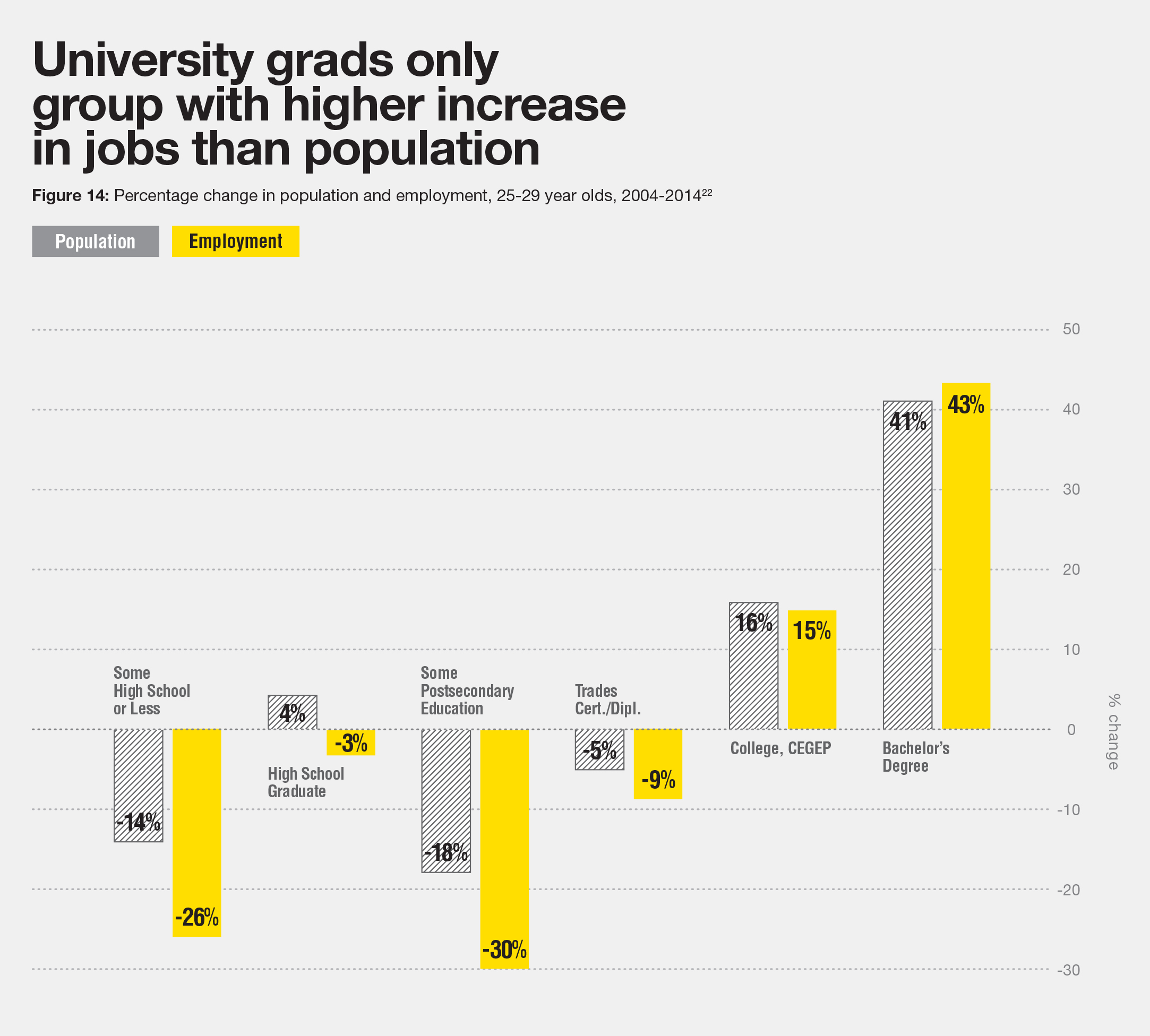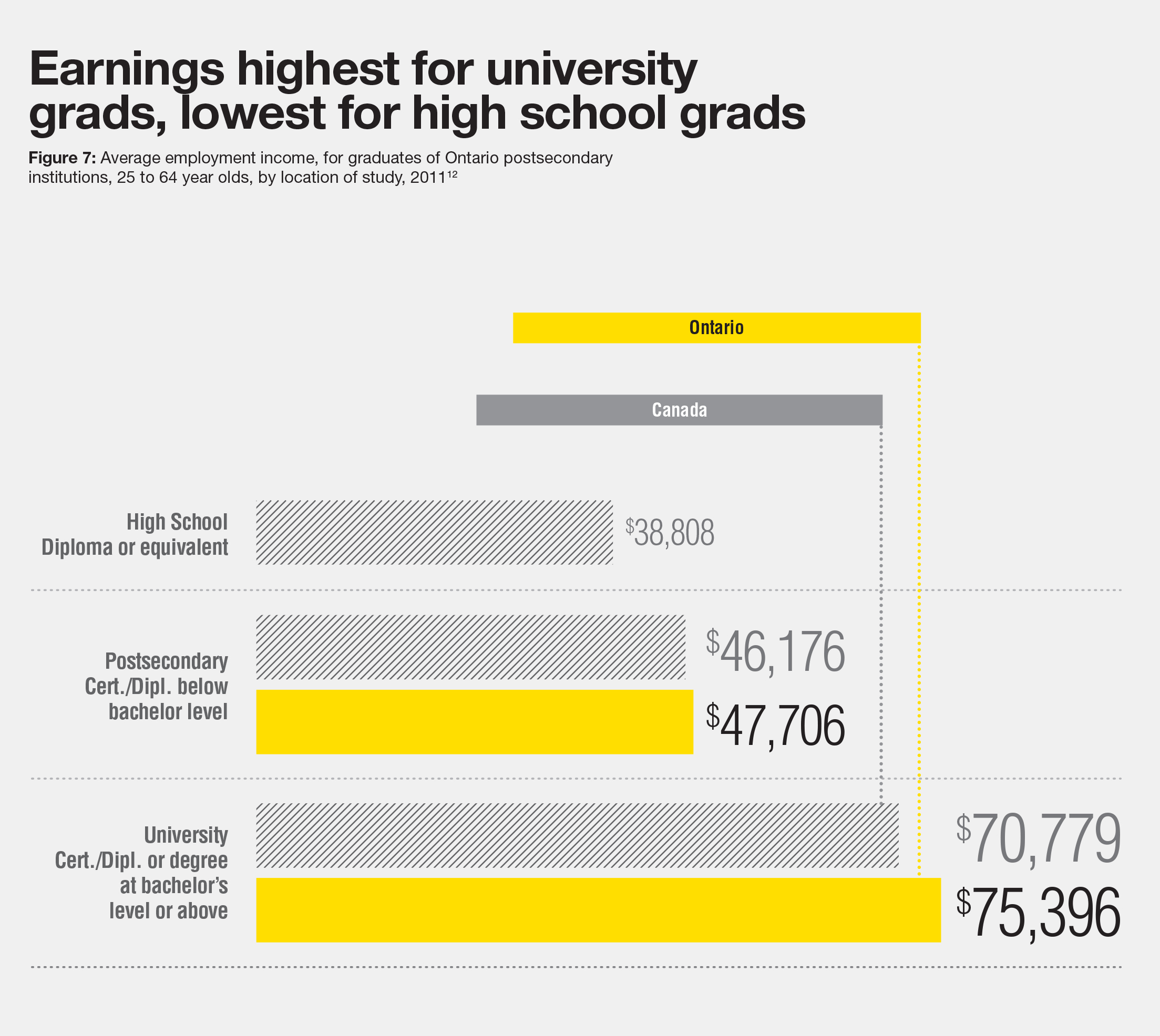Growing up in China, Jing Wen Luo knew she wanted to attend university in North America.
She also knew she wanted to go to a school that would help her gain employment experience. Today she is working for Purolator, billed as Canada’s top courier company.
“A lot of schools did not provide co-op to international students but Brock was an exception,” Luo says. “That’s why I chose Brock.”
The 25-year-old, who graduated in 2014 from Brock University’s Goodman School of Business, says the five work terms she did while studying at Brock opened up the world of work to her.
“My resume was literally blank,” she says, noting in China she was focused on her studies.
Evidence shows that having a university education leads to more employment opportunities and higher paying jobs, according to the Council of Ontario Universities (COU).
In its recent report University Works, COU used Statistics Canada’s Labour Force Survey (Ontarians 25 and older). It found university graduates have the highest employment rates among all post-secondary education levels — 73.7 per cent for those with a bachelor’s degree and 75 per cent for those with advanced degrees, compared to an employment rate of 72.4 per cent for college graduates.
“College and university grads are just as likely to get jobs, but on average university graduates make significantly more money,” says the report’s author Cecilia Brain, economist and senior policy analyst with COU.
The University Works report states that, on average, Ontario university graduates earn 58 per cent more than graduates of other Ontario post-secondary programs.
The 2014-15 Graduate Employment Survey — conducted by CCI Research Inc. for the Ministry of Training, Colleges and Universities — found the Brock University graduate employment rate six months after graduation was 91.1 per cent compared to 87.6 per cent in Ontario. Two years after graduation, Brock’s grad employment rate continues to top the provincial average, at 94.6 per cent compared to 93.6 per cent.
Luo said her first co-op term taught her what she didn’t know about work and employment culture, and prepared her for her next work term – at Siemens Canada in Hamilton. She stayed in the role for two terms during a time of transition for the company, which was moving the plant to the U.S.
“For me it was an opportunity, because a lot of people were leaving so the manager gave me a lot of responsibility,” she says.
Seeing how companies are run, the importance of efficiencies, and a supply chain in action changed the course of her life, she says.
“After that placement, I decided to add another concentration to my degree — operations management.” Finance was her other concentration.
After Siemens, Luo spent two work terms at Hydro One.
“It opened my eyes to how different the company culture can be,” she recalls.
Luo says Brock gave her the tools she needed to be competitive in the job market following graduation.
“It’s dramatic. I don’t know how I would have turned out without the co-ops. I grew so much from one work term to another. Co-ops really expedited the process of the development of me.”
After graduating, Luo turned down a job offer at Siemens for a role at Purolator, where they are doing a pilot project focused on developing young professionals. The job was tailored for her, after she spent the day with CEO Patrick Nangle. That was the result of winning CEO x1 Day, a highly competitive contest for university students.
Hiring Brock co-op students full-time following graduation is not unusual for the Toronto accounting firm Collins Barrow, says Chief Operating Officer Rhonda Klosler.

Collins Barrow Chief Operating Officer Rhonda Klosler
“We continue to recruit from Brock,” says Klosler. “We are a very entrepreneurial organization and we find the students who go to Brock have a similar mindset.”
Klosler knows the Brock culture well. She graduated with a Business Administration degree in 1993.
She worked co-op for the accounting firm Smith Nixon, which eventually merged with Collins Barrow.
“I’ve essentially been with the same firm for my entire career and it’s as a result of Brock’s co-op program,” she says. “The opportunities that are available to students in the co-op program are limitless and I’m proof of that.”
Julia Zhu, Associate Director of Co-op Programs at Brock, says the University has one of Ontario’s most diverse offerings of courses that include a co-op component.
“We are one of the leaders in providing co-op education,” she says.
Brock’s commitment to co-op programs is about preparing students for the job market and helping them use the knowledge they learn in the classroom in the work world.
“It’s a way to gain hands-on experience and test drive opportunities,” she says.
Anna Lathrop, Vice Provost of Teaching and Learning, says experiential learning is one of Brock’s defining pillars, and co-op is an important part of that.
“We feel that we are preparing the 21st century learner,” says Lathrop. “The co-op experience is designed to reinforce the theory in an employment setting.”
Every year, Canadian employers take more than 1,000 Brock students into the workplace, and the co-op job placement rate is higher than 90 per cent.
Zhu says students have to apply to take part in a co-op program while still in high school, and grade requirements are higher. As well, students are taught to get co-op work placements using traditional job search techniques, including resumes and cover letters, and interviews.
“By the time they leave Brock, they will have life-long employment skills,” Zhu says.

Graph courtesy of Council of Ontario Universities

Graph courtesy of Council of Ontario Universities









